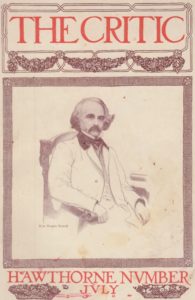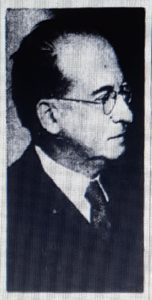Two small articles/reviews from the Detroit Jewish Chronicle concerning Benjamin DeCasseres and Nietzsche. The first about “Germans, Jews and France,” published November 15, 1935, followed by “I Dance With Nietzsche,” published December 11, 1936, enjoy.
DeCasseres Shows Nietzsche Hated the German People
Benjamin DeCasseres, eminent writer and critic, descendant of the family of Baruch Spinoza, is the author of a pamphlet, “Germans, Jews and France,” in which is compiled a series of statements from the writings of Nietzsche. This pamphlet, published by the Rose Printers & Publishers, Inc., 91 Runyon St., Newark, N.J., proves that contrary to the claims of Nazis, Nietzsche hated the Germans and had the highest respect for the Jews. DeCasseres took the excerpts in this pamphlet from the 15 volumes of Nietzsche’s works. In a foreword to the booklet he states: “In Germany his universal doctrine of Will-to-Power and his ideal of Superman have been used by professors and mob-masters as philosophy to excuse their atrocities, their sadism and their totalitarian-state crimes. But they have carefully concealed what you will find in this booklet.”
In his attack on the Germans, Nietzsche is quoted among other things as follows:
“German intellect’ is my foul air.”
“When I try to think of the kind of man who is opposed to me in all my instincts, my mental image takes the form of a German.”
“Even the presence of a German retards my digestion.”
“I can no longer abide the (German) race.”
“I was condemned to the society of the Germans.”
Under the caption “Germany and the Germans,”Mr. DeCasseres has compiled a chapter of quotations among which we read:
“The Germans have not the faintest idea how vulgar they are.”
“The spirit of Germany—soft, swampy, slippery soil.”
“A man lowers himself by frequenting the society of Germans.”
Another chapter in which he condemns the Germans is titled “German Culture.”
Three of the 31 pages are devoted to a discussion of the Jews, and he says of them:
“What a blessing a Jew is among Germans!”
“This race (the Jews) should not be irritated without necessity. Therefore anti-Semites should be expelled from Germany.”
“Since Wagner’s return to Germany he has condescended to everything that I despise—even to anti-Semitism.”
“In respect to cleaner intellectual habits, Europe is not a little Indebted to the Jews; above all, the Germans as being a lamentably deraissonable race, who, even at the present day, must always have their ‘heads washed. ‘It has always been the Jews’ problem to bring a people to raison.”
“It was Heinrich Heins who gave me the most perfected Idea of what a lyrical poet could be.”
“Among Jews I did, indeed, find taste and delicacy toward me, but not among Germans.”
“The Jews are beyond all doubt the strongest, the toughest and purest race at present living in Europe.”
A two-page chapter on France pays tribute to the French as compared to the Germans he despised. Nietzsche is quoted as saying: “We Germans are nearer to barbarism than the French.”
Detroit Jewish Chronicle – November 15, 1935, P.6
DeCasseres “Dances With Nietzsche”
Benjamin DeCasseres, lineal descendent of Spinoza, ranks among the outstanding authorities on the German philosopher, Nietzsche, whose name has been invoked by Nazis in the campaign against the Jews. A short time ago DeCasseres published a pamphlet entitled “Germans, Jews and France by Nietzsche” in which he compiled the writings of this German to prove that instead of being a hater of Jews, Nietzsche, rather, favored them and despised the Germans.
A great lover of Nietzsche, DeCasseres is continually writing commentaries on his works and one of the most interesting of his pamphlets entitled “I Dance with Nietzsche” has just come off the press. It is procurable at 50 cents from him, care of the Blackstone Publishers, 118 W. 27th St., New York City.
The title of this pamphlet is derived from Nietzsche’s having been referred to as the Dancing Philosopher. A most interesting tribute to Nietzsche is contained in this pamphlet in which DeCasseres writes:
“No one has stimulated me over a longer period of time than Nietzsche. Merely to pick up one of his books after reading him for 30 years gives me a great thrill, physical, mental and metaphysical. With a book of his in my hand I feel precisely like a person who holds a bomb.”
“I love him because he inflames every part of my physic and physical life. He is perpetual ecstasy, orgasm. He inflames me to intellectual anger, quite often, as well as to dancing with intellectual joy. But I thank him for infuriating me almost as much as I thank him for penetrating me with mental ecstasy. For whether I agree or disagree with him, he causes my emotions, my thoughts, my nerves to dance.”
Elsewhere in this booklet, Mr. DeCasseres states:
“The prophet and writer in Nietzsche are straight out of the Old Testament. He is of the strain of Isaiah and Jeremiah, King David and Jesus. He is an Old Testament Jew transposed to a modern sensibility. He Is par excellence the Puritan. He is in no sense Greek. He is Oriental. “His “funeral of God’ Is somewhat pathetic, for he has resurrected Jehovah under the name of the Superman. ‘Sacrifices’ are demanded in the name of the Superman. Here is the God of the Old Testament again.”
DeCasseres calls Nietzsche “the greatest phychologist of all time, one of the greatest poets who have ever lived, one of the master-stylists of world-literature, one of the Six Colossi of Thought, the incarnation of all militant Individualists that have been and the protagonist of those to come — sublimely beautiful soul whose like we shall probably not see again.”
Detroit Jewish Chronicle – December 11, 1936 P.13

